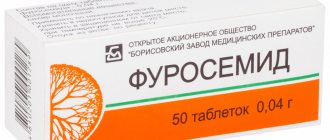The pharmaceutical product is one of the most common medications and has a wide range of therapeutic effects. In tablet form, it is often prescribed to patients of all age groups.
Many people wonder how to be treated with Ibuprofen, what are their benefits, but even if you know the answers to these questions, do not rush to start using them without consulting a doctor
When is it appointed?
Ibuprofen is to some extent a harmless drug, but if there are contraindications noted in the instructions, you should stop using the medicine. The opposite can lead to dire consequences. In addition, you cannot take an increased dose of medication, as there is a serious danger to life and health.
Benefits for headaches
Ibuprofen will be a good help when you suffer from excruciating headaches. In particular, it is prescribed for migraines, characterized by prolonged pain. In this situation, the drug should be used as soon as possible after the onset of migraine symptoms. If your health does not improve, repeat taking the medicine after 5 hours. This treatment regimen is very effective and most often leads to a positive result.
When nervous tension occurs, “discomfort” occurs; in this situation, an Ibuprofen tablet will help.
Ibuprofen for toothache and menstruation
The medicine is a pathognomonic drug. If there is no way to get an appointment with a dentist, you can take an Ibuprofen tablet to relieve toothache. You should not take more than 6 tablets of the drug per day, the treatment course is a maximum of 5 days.
Ibuprofen will be useful after implant placement and tooth extraction; it will help relieve pain.
During menstruation, many women experience pain; to relieve it, it is advisable to take Ibuprofen. However, you should beware of overdose. The first dosage should be 400 mg; if the discomfort does not go away, after a few hours you will have to repeat the medication.
Treatment in this case should not exceed 3 days; if a positive result is not noted, consult a doctor.
Ibuprofen for colds
Each property of the drug is very effective for various types of colds. After taking Ibuprofen, the fever quickly passes, pain decreases, due to which the patient’s condition quickly returns to normal.
To treat colds, tablets can be prescribed to persons over 12 years of age. The doctor may prescribe a different dosage than indicated in the instructions. Of course, Ibuprofen alone is not enough to get rid of a cold, but its anti-inflammatory properties help enhance the effects of other medications. Thanks to all this, recovery is accelerated.
Ibuprofen for fever
With many illnesses, people's body temperature rises; Ibuprofen will help reduce it. The pharmaceutical is prescribed as part of a complex therapeutic course for various diseases:
- Cold
- Injuries
- ENT diseases
- Viral, bacterial infections
- Joint and muscle pain
What forms does Ibuprofen come in?
In pharmacies you can find four dosage forms of the drug:
- If there are no contraindications related to the gastrointestinal tract, then people usually choose tablets or capsules.
- In cases where there is a stomach disease in the acute stage or the patient for some reason cannot swallow a tablet, suppositories are prescribed.
- Syrups are prescribed to infants. Most pediatricians prefer to reduce fever using Ibuprofen rather than Paracetamol, since the former acts faster and longer, and also has a lower safety profile due to the absence of toxic metabolites.
- For pain in the joints, muscles, back, and injuries, the ointment is ideal.
Use during pregnancy and breastfeeding
It is not advisable to take ibuprofen and certain medications while pregnant. Although fever and pain pose a threat, the corresponding signs require quick elimination.
Ibuprofen, as recommended by your doctor, can be taken in the 2nd trimester; you should not be treated with it if there are contraindications. The medicine is contraindicated in the first or third trimester of pregnancy.
When breastfeeding, the medicine also quickly eliminates fever and eliminates pain. However, it can pass into breast milk and cause some harm to the baby, although there will be no serious health hazard. If there is an urgent need to take medication, the tablet should be taken after feeding. The concentration of the active substance in milk reaches a large amount 2 hours after administration, and then begins to rapidly decrease.
Interaction with other drugs
Ibuprofen was created back in 1953 and is therefore well studied. Here we will briefly list its interactions with common drugs - this is mainly a group of cardiovascular drugs, some antibiotics. A complete list of drug interactions should be read in the instructions for the drug.
- Reduces the effect of ACE inhibitors, beta-blockers and some diuretics, such as furosemide.
- The effect may be enhanced when taken with anticoagulants.
- The activity of amlodipine decreases.
- Caution should be used when taking warfarin, methotrexate and lithium together.
- Interactions have been noted with cardiac glycosides, quinolone antibiotics, ethanol, barbiturates, rifampicin, phenylbutazone, cyclosporine, mifepristone, tacrolimus, zidovudine, cefoperazone, cefotetan, valproic acid.
Ibuprofen analogs
Level 4 ATC code matches:
Artrum
Brustan
Ketonal Duo
Nurofen Plus
Nurofen Express
Nurofen Forte
Nurofen Express Lady
Nurofen for children
Nurofen
Ibuprom
Advil
MIG 400
Has
Ketoprofen
Vimovo
Naproxen
Flexen
Nalgesin
Flamax
Novigan
Synonyms (analogs of Ibuprofen with the same active ingredient):
- Ibuprofen-Hemofarm
- Nurofen
- MIG 400
- Ibuprom
- Faspik
- Solpaflex
- Advil
Generic dosage forms for external therapy are the following drugs:
- Dolgit
- Ibalgin
- Nurofen
- Ibuprofen-Verte
Ibuprofen or Nurofen - which is better?
Nurofen is a medicine based on ibuprofen. That is, the drugs are generics. They are distinguished from each other by manufacturer, price and composition of auxiliary components.
Side effects
The annotation for dosage forms for oral use and rectal suppositories lists the following side effects:
- NSAID gastropathy , dryness, irritation and/or ulceration of the oral mucosa, pain in the mouth, pancreatitis , aphthous stomatitis ;
- hepatitis;
- bronchospasm , shortness of breath ;
- noise/ringing in the ears, hearing loss;
- double vision or decreased clarity of visual images, irritation and dry eyes, toxic damage to the optic nerve , scotoma , swelling of the eyelids, swelling of the conjunctiva;
- nervousness, headache, anxiety, confusion, insomnia/drowsiness, dizziness, mental and motor agitation, hallucinations, depression, aseptic meningitis (rare and mainly in patients with autoimmune diseases );
- decreased contractility of the heart muscle, increased blood pressure, tachycardia ; acute renal failure, polyuria , nephrotic syndrome , allergic nephritis , cystitis ;
- hypersensitivity reactions;
- anemia , thrombocyto- and leukopenia , Werlhof's disease , agranulocytosis ;
- increased sweating.
The likelihood of visual impairment, development of gastric/intestinal bleeding and ulceration of the walls of the digestive canal increases with long-term use of high doses of Ibuprofen.
The drug affects laboratory parameters, namely:
- increases bleeding time;
- reduces serum glucose concentration, Clcr, hematocrit and hemoglobin ;
- increases the activity of liver transaminases;
- increases the concentration of creatinine in the blood serum.
Side effects when applied topically in gel/ointment form:
- tingling/burning sensation;
- skin hyperemia.
With long-term use of external therapy, the systemic effects inherent in all NSAIDs may develop.
special instructions
In case of severe pathologies of the musculoskeletal system, it is advisable to combine external therapy with oral forms of NSAIDs.
During the period of use of Ibuprofen, it is necessary to monitor changes in renal/liver function and peripheral blood patterns.
If signs of NSAID gastropathy , the patient requires a blood test to determine the hematocrit number and Hb, a stool test for occult blood, and esophagogastroduodenoscopy. To prevent the development of gastropathy , Ibuprofen should be combined with PgE medications.
If it is necessary to determine 17-KS, the drug is discontinued 48 hours before the study.
Patients taking Ibuprofen should refrain from any activity that requires high concentration and speed of mental/motor reactions.
It should be remembered that this remedy should be used in the minimum effective dose and for the shortest possible course to reduce the likelihood of developing undesirable reactions from the digestive system.
Contraindications
General contraindications:
- complete or partial combination of symptoms of the Fernand-Vidal triad (including a history);
- the presence of erosions and ulcers in the digestive canal;
- hemostasis disorders ;
- active gastric/intestinal bleeding ;
- severe liver failure;
- progressive kidney pathologies;
- renal failure in which Clcr does not exceed 30 ml/min;
- conditions after CABG ( coronary artery bypass grafting );
- chronic inflammatory processes in the intestines;
- confirmed hyperkalemia ;
- 3rd trimester of pregnancy;
- hypersensitivity.
In pediatrics, suspension and suppositories are used from 3 months, tablets - from 6 years of age.
Caution should be exercised when prescribing Ibuprofen for:
- liver cirrhosis , which is complicated by portal hypertension ;
- gastritis;
- colitis;
- enteritis;
- history of stomach/duodenal ulcer
- nephrotic syndrome;
- insufficiency of heart, kidney or liver function;
- IHD;
- arterial hypertension;
- cerebrovascular diseases;
- dys- or hyperlipidemia ;
- peripheral arterial diseases;
- the presence of Helicobacter pylori infection ;
- severe somatic pathologies;
- blood diseases of unknown etiology.
The drug is also prescribed with caution to persons suffering from alcoholism , long-term use of NSAIDs, taking oral corticosteroids, SSRIs, antiplatelet agents and anticoagulants, in the first 26-27 weeks of pregnancy, and lactating women.
Children under one year of age should be given the drug only on the recommendation of a pediatrician.
Indications for use
Rheumatoid arthritis, osteoarthritis, articular syndrome with exacerbation of gout, psoriatic arthritis, ankylosing spondylitis (ankylosing spondylitis), cervical spondylosis, Barre-Lieu syndrome (cervical migraine, vertebral artery syndrome); neuralgia, myalgia, tendinitis, bursitis, tendovaginitis, neuralgic amyotrophy, sprain of the ligamentous apparatus, hematomas, radiculitis, traumatic inflammation of soft tissues and the musculoskeletal system; febrile conditions of various origins (including after immunization); symptomatic treatment of influenza and ARVI; postural hypotension when taking antihypertensive drugs; nephrotic syndrome (to reduce the severity of proteinuria). As an adjuvant: infectious and inflammatory diseases of the ENT organs (tonsillitis, pharyngitis, laryngitis, sinusitis, rhinitis), bronchitis, pneumonia, inflammatory processes in the pelvis, adnexitis, primary dysmenorrhea, algodismenorrhea, postoperative pain, headache and toothache, panniculitis.





